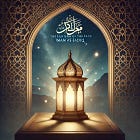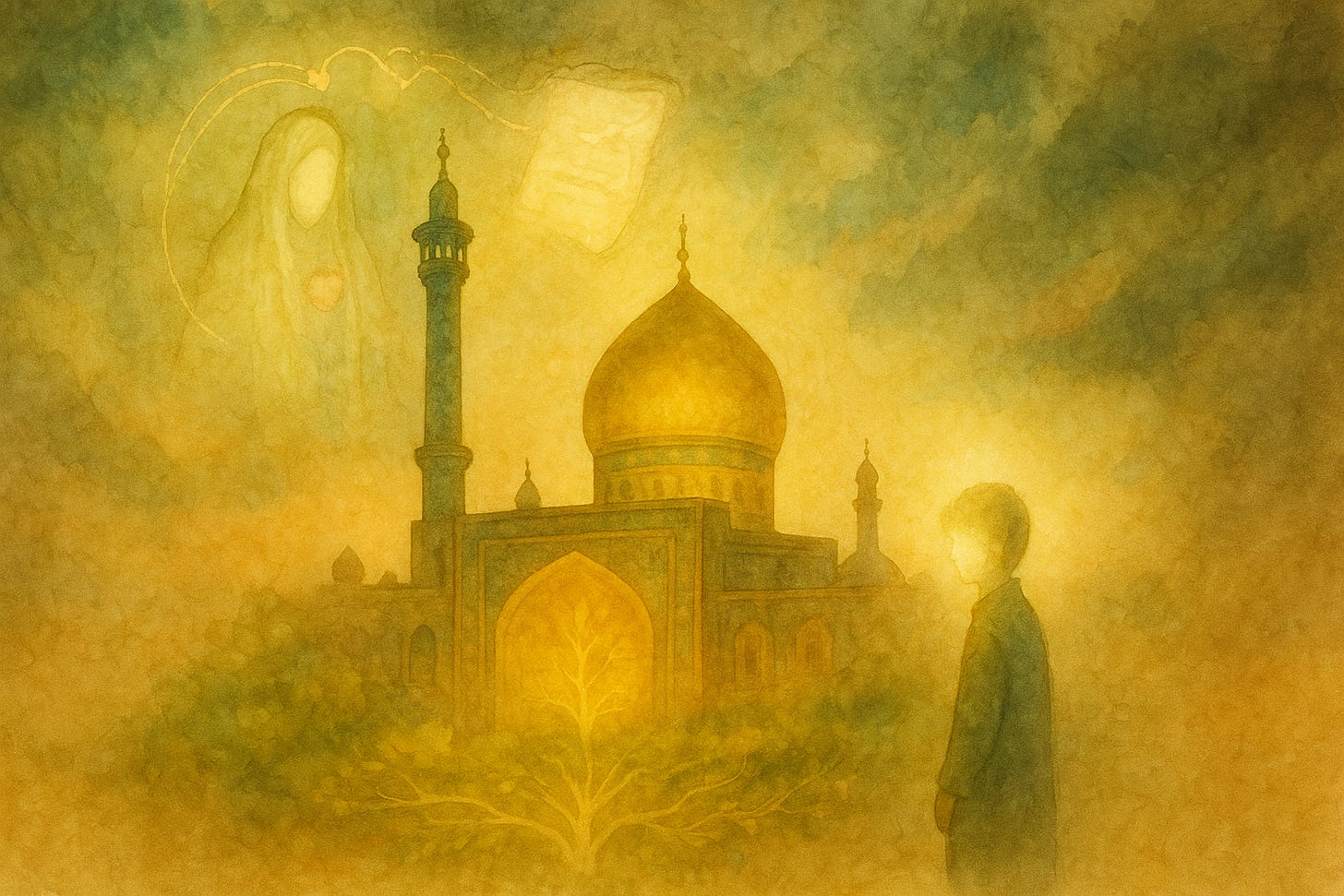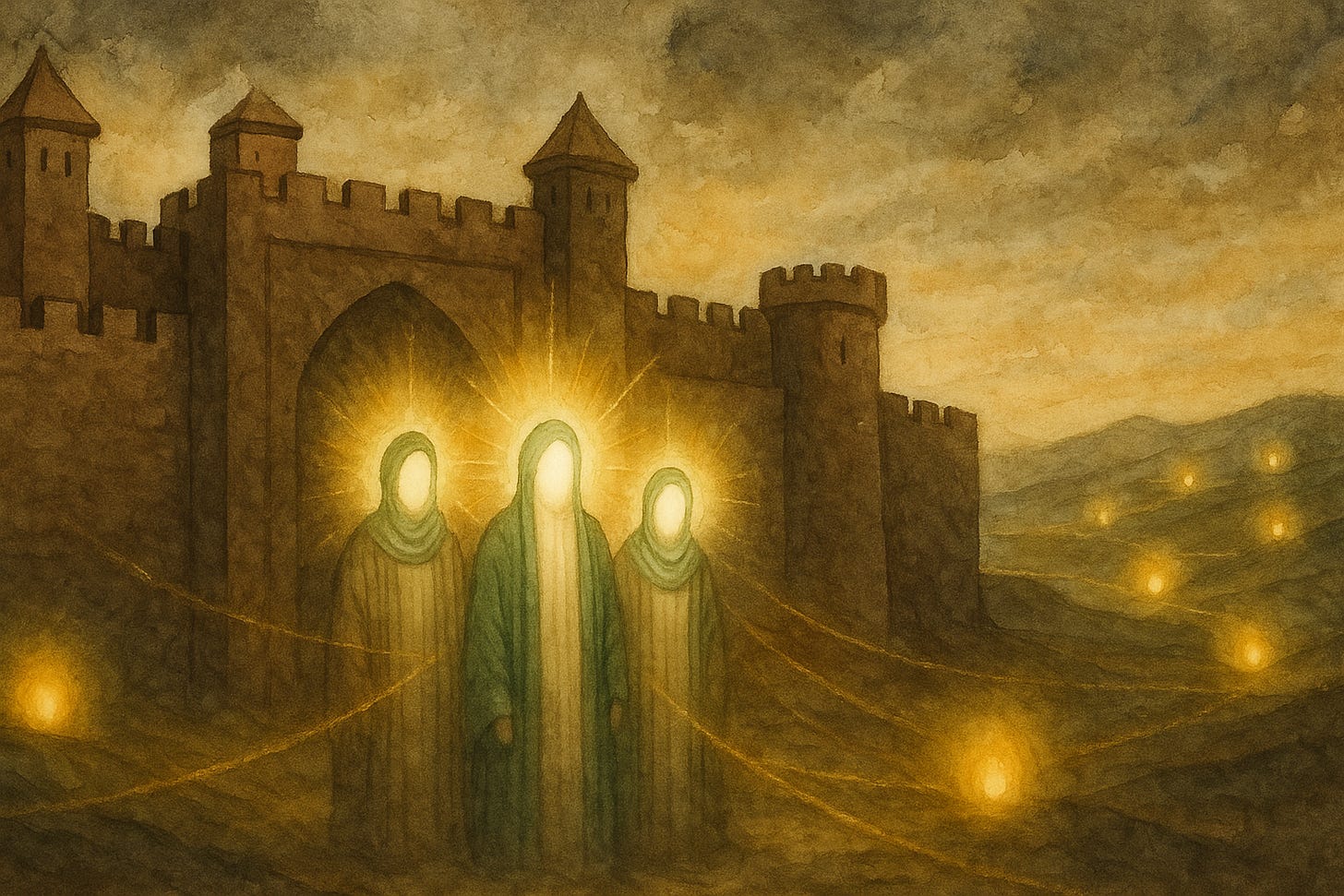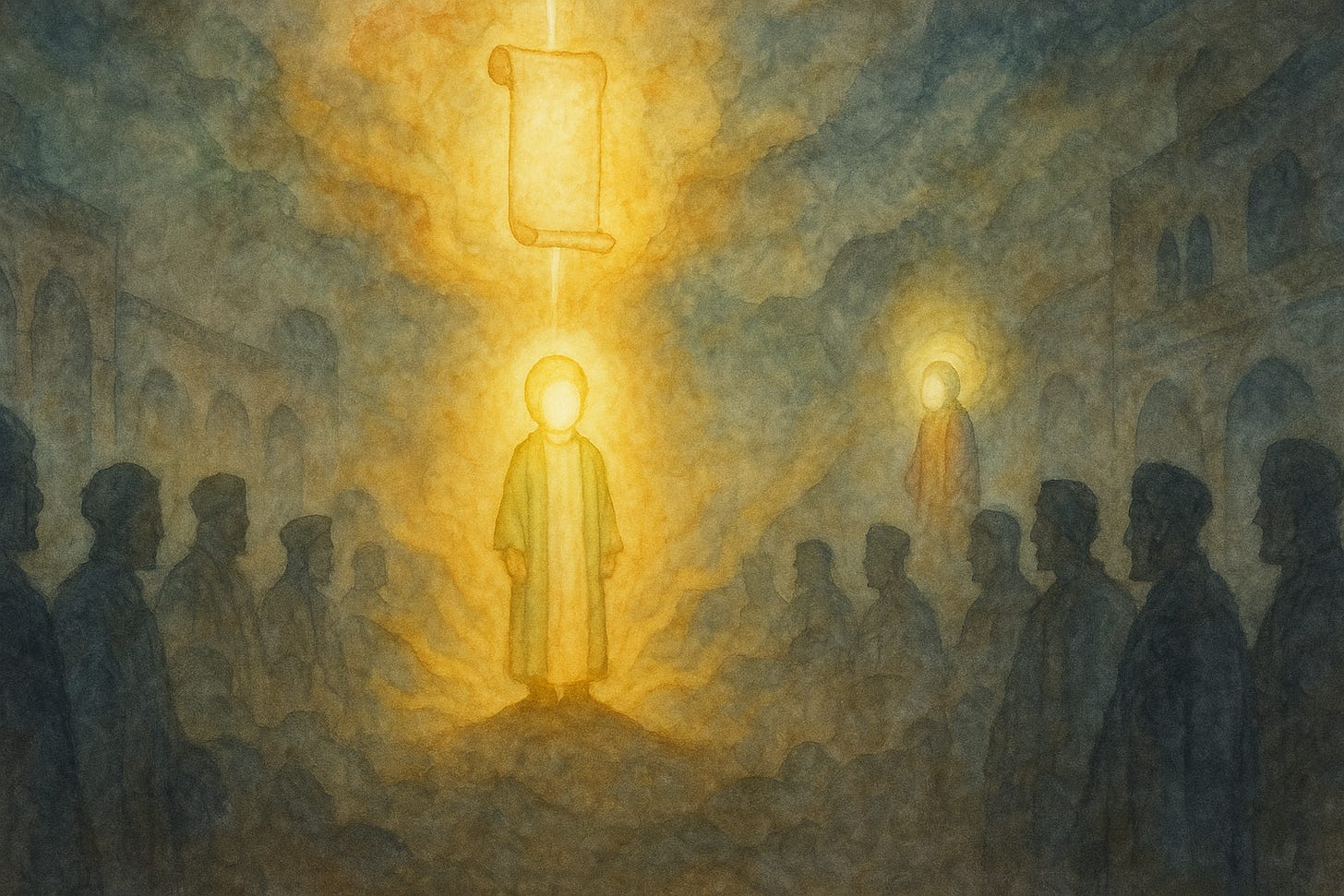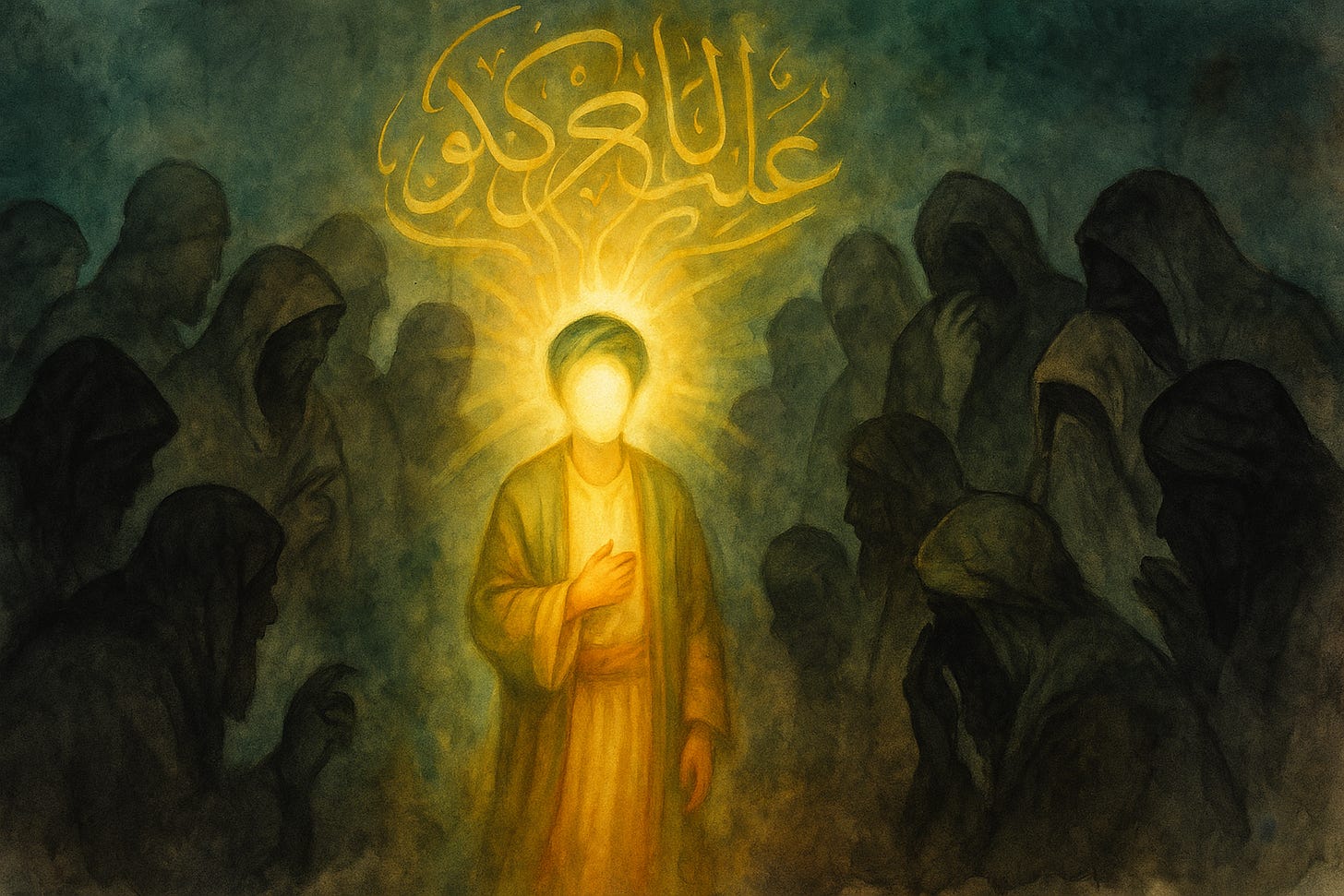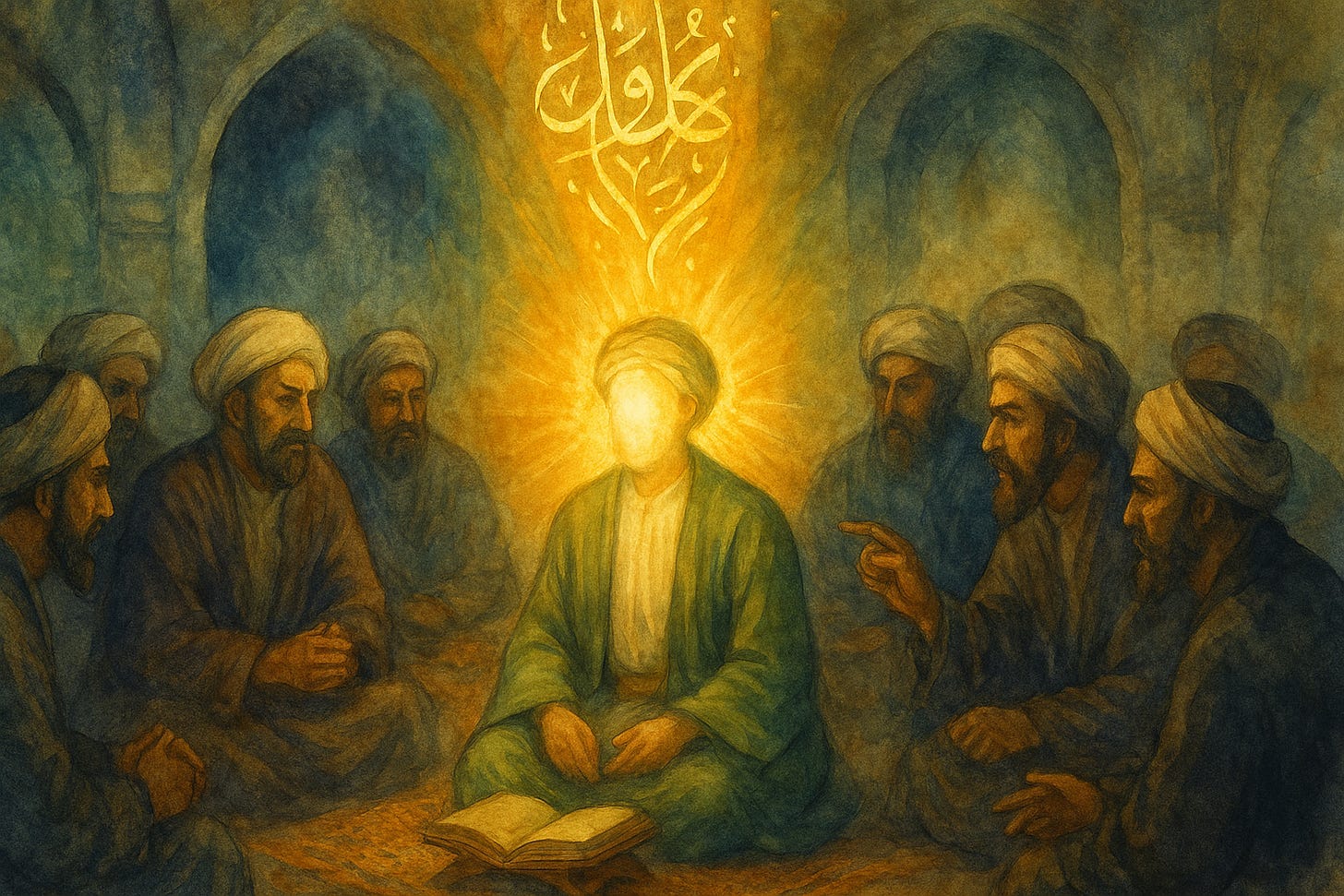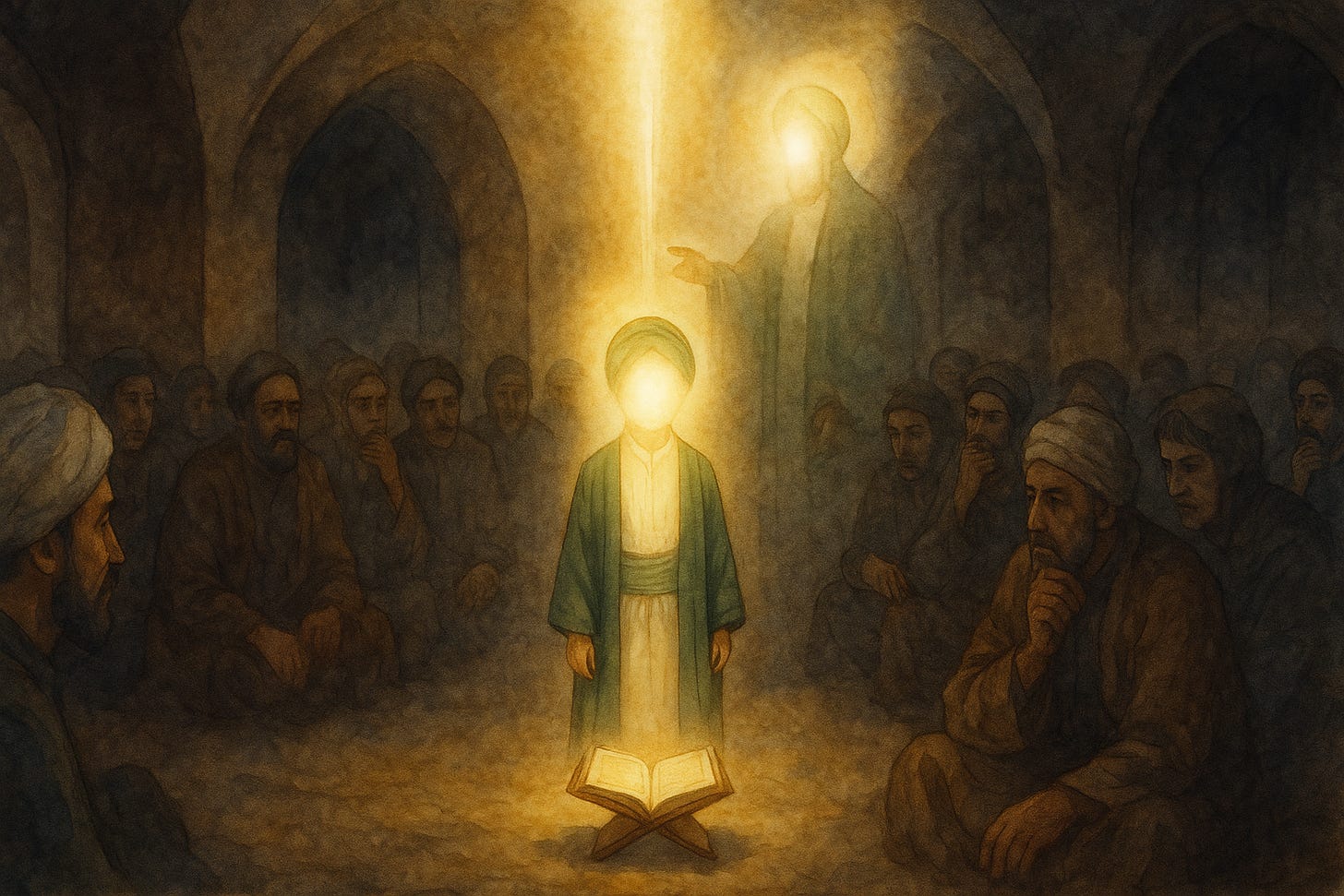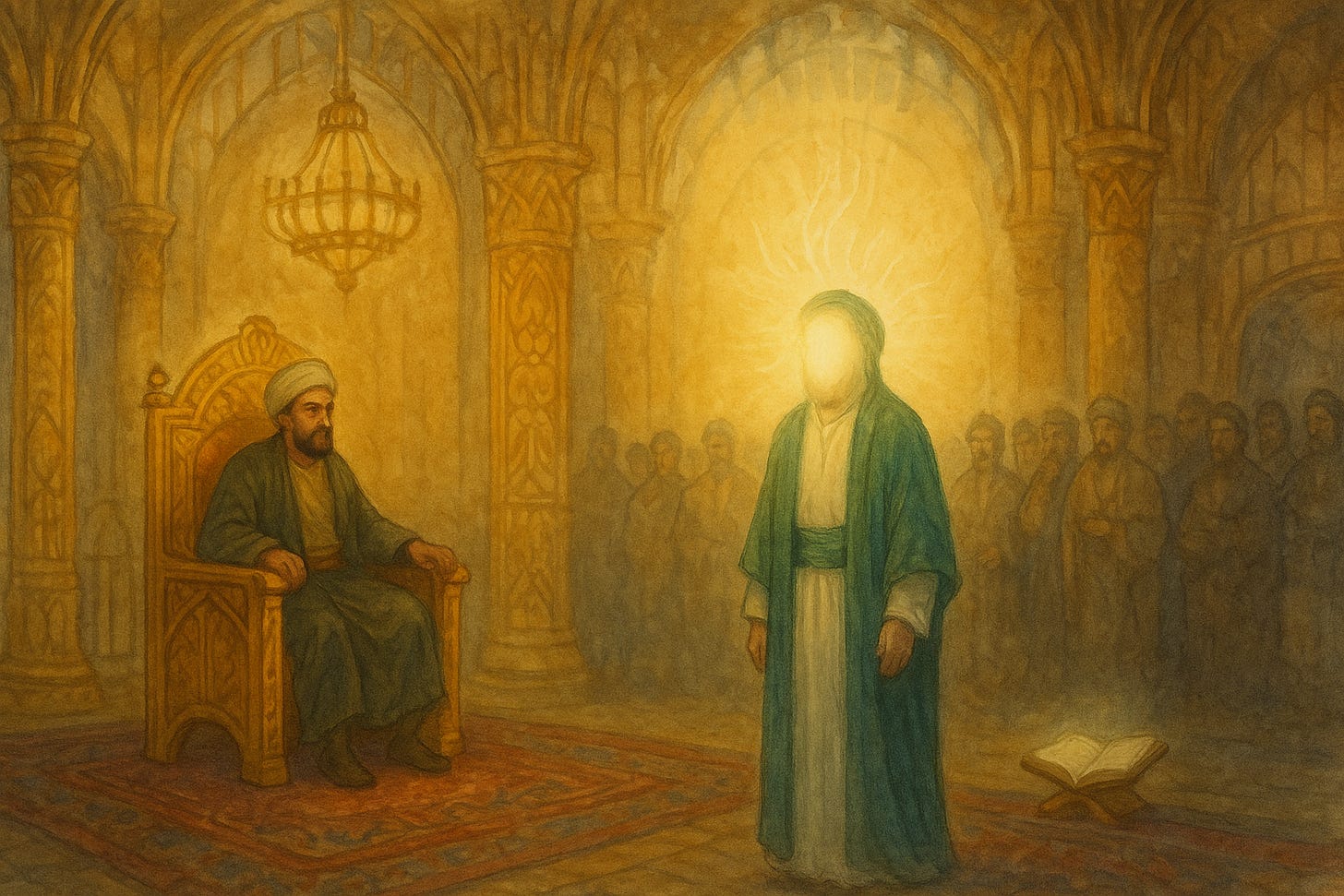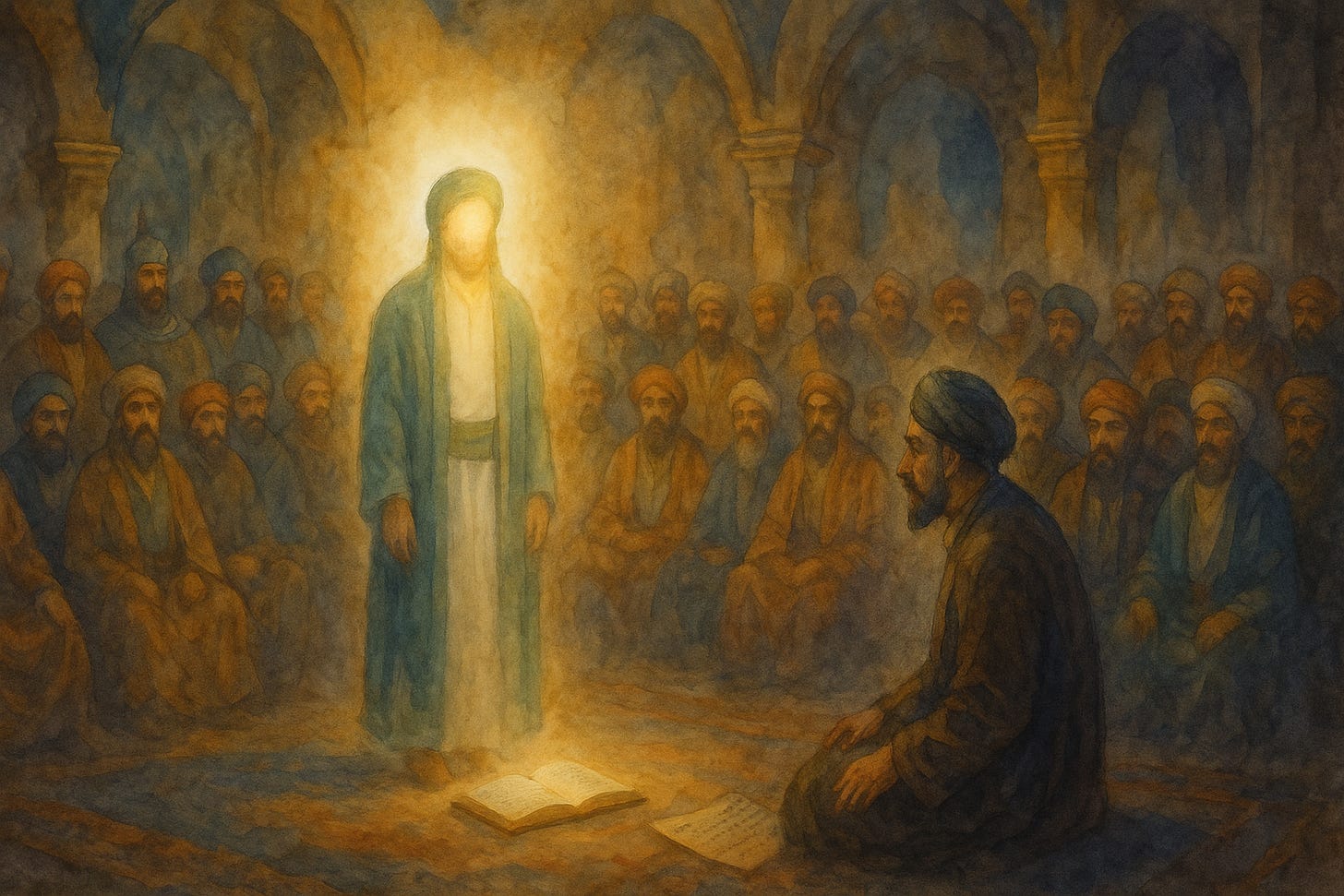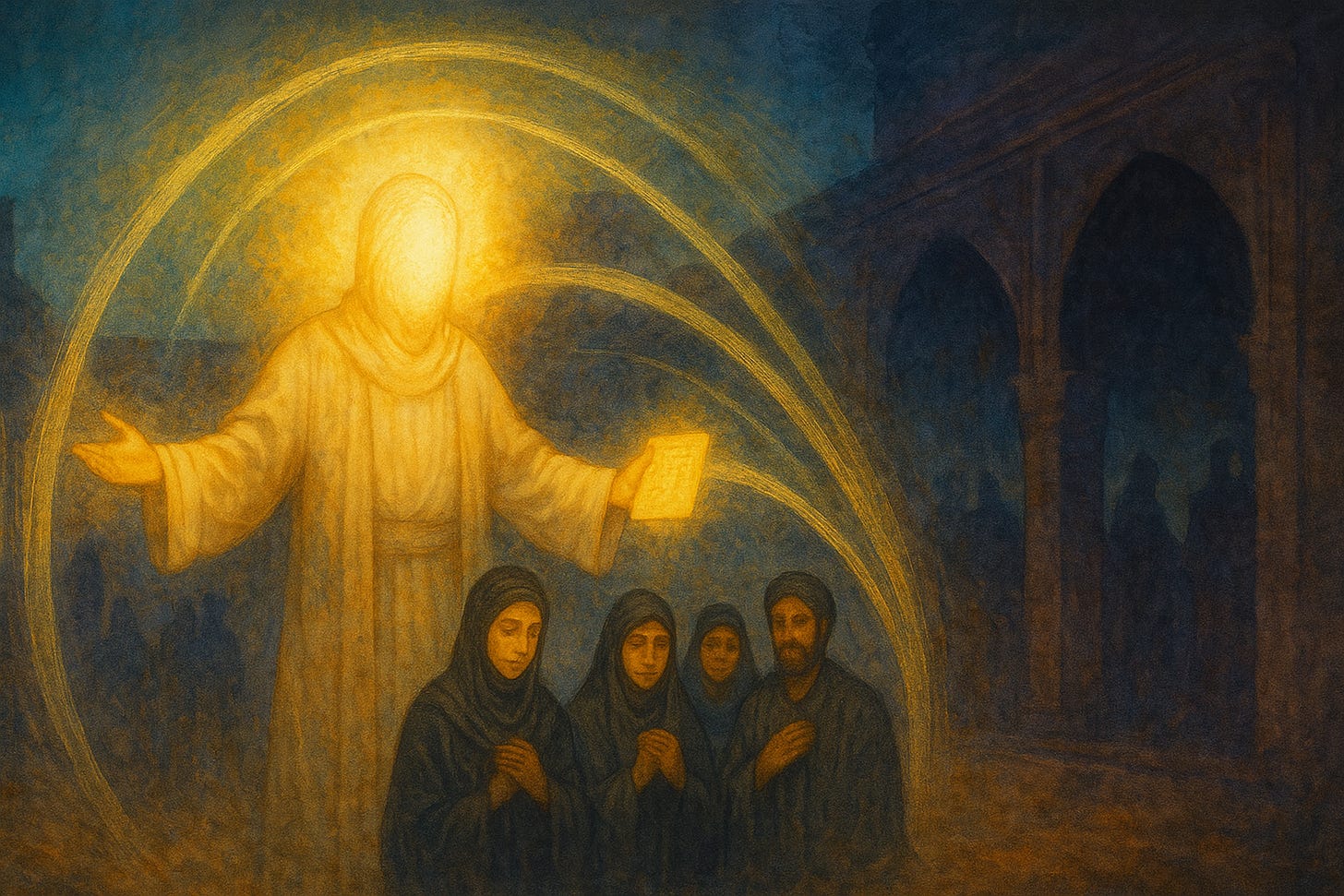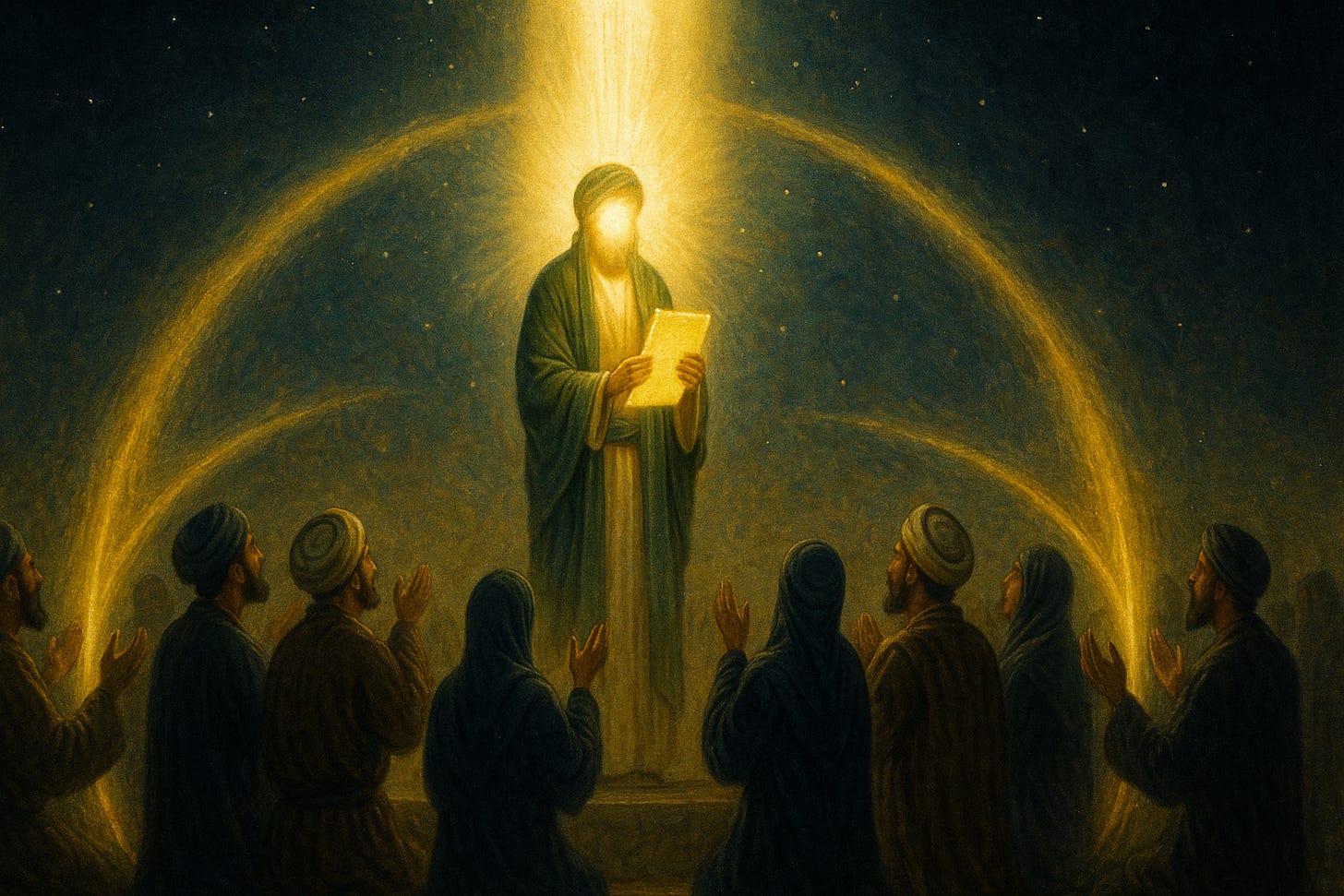[39] Imamah (Leadership) – Imam Muhammad al-Jawad - Part 1: Youthful Authority & Eternal Clarity
A series of discussions on the teachings of Imam Sadiq (sixth Imam of the Muslims), from the book Misbah ash-Sharia (The Lantern of the Path)
In His Name, the Most High
With this session, we once again introduce a new, vibrant thread to our discussion, and as we begin to weave it into our study, we find ourselves guided by the echoes of our past reflections. The foundational principle of our study remains unchanged: each session builds upon the last, weaving together into a larger, interconnected tapestry.
Over our last two gatherings, we journeyed with the Noble Lady of Qom, Sayyedah Fatimah al-Ma’soumeh—a story of unwavering loyalty to her brother, Imam Ali ibn Musa al-Ridha, whose own trials we had explored just before.
That history of the brother and sister—of sacrifice, loyalty, and the establishment of divine trusts in distant lands—is the very context in which our next reflection must be understood. For the light of the Imamate, which shone so brightly in the father and was so loyally defended by the aunt, now passes to the son.
Today, we turn our hearts towards the ninth Imam, the son of Imam al-Ridha and the nephew of Sayyedah Ma’soumeh, Imam Muhammad ibn Ali al-Jawad (peace be upon him).
His story is not separate from theirs; it is the next chapter in the epic of divine leadership confronting worldly tyranny. It is a story of youthful authority, of a wisdom that defied age, and of a clarity that unmasked the most sophisticated hypocrisy of his time.
With the epic of the Imam of Khorasan and the Lady of Qom fresh in our minds, let us now turn to the story of the Imam of Youthful Authority.
In His most beautiful Name, and with full trust in His support, imploring His assistance and guidance, we proceed…
The previous parts can be found here:
Video of the Majlis (Sermon/Lecture)
This is the video presentation of this write-up as a Majlis (part of the Truth Promoters Weekly Wednesday Majlis Program)
Audio of the Majlis (Sermon/Lecture)
This is the audio presentation of this write-up as a Majlis (part of the Truth Promoters Weekly Wednesday Majlis Program)
Recap
The Lady of Light and the Covenant of Qom
Over our last two sessions, we had the profound honour of journeying with the Noble Lady of the Ahl al-Bayt, Sayyidah Fatimah al-Ma’soumeh (peace be upon her). We traced her life from a sacred history of sacrifice to the deep theology of her legacy.
Our reflection began with her journey of loyalty. We established that her departure from Madinah was not merely a family visit, but a sacred Hijrah—a conscious, political, and spiritual migration towards the Imam of her time, her brother Imam al-Ridha. This courageous act was a public sermon in motion, a powerful lesson in active loyalty and a definitive rejection of the Abbasid tyrant who sought to isolate the Imam. Her journey, which ended in sacrifice when her caravan was ambushed at Saveh, taught us the absolute prohibition of inclining towards oppressors, a principle that echoes today in the unwavering stance of the Resistance.
We then saw how her martyrdom was not an end, but the planting of a divine trust. Her burial in Qom fulfilled stunning prophecies from the Imams, transforming a humble town into a sanctuary (haram) for the Ahl al-Bayt. Her shrine became a living Baqiyyat Allah—a remnant of God—from which a civilisation of scholarship and revolution would grow, making Qom a fortress of knowledge and a base for the awakening of the Ummah.
From this history, we moved to the theology of her Ziyarah, understanding it as a school of divine knowledge. We learned two critical lessons:
The Ziyarah is built upon the condition of Recognition (Ma’rifah). The reward of Paradise for visiting her is unlocked only by “knowing her right”—recognising her as a perfect mirror of the Imamate. This recognition demands that we embrace the twin pillars of faith: loving loyalty to the camp of God (Tawalla) and principled disassociation from the camp of falsehood (Tabarra).
The Ziyarah teaches us the reality of Intercession (Shafa’ah). We ask her to intercede for us because she holds a “lofty station” before Allah. This concept of seeking a divinely-appointed bridge of mercy teaches us our own worldly duty: to become intercessors for the oppressed, standing in solidarity with them and amplifying their voices.
Ultimately, we discovered that her life and her Ziyarah seal a single, profound Covenant of Qom: a pledge to live and die on the path of Muhammad and his family.
Her life was a test of loyalty for her companions, and her legacy continues to test ours. This very theme of loyalty being tested now leads us from the story of the aunt to the story of her nephew, the son of Imam al-Ridha. For with the martyrdom of his father, the Ummah would face its most difficult examination yet, in the person of a young boy who was destined to become the next Imam.
Prologue: The Three Imams of Samarra
Our journey now enters a new and decisive phase in the epic of the Imamate. We leave behind the era of overt public debate in the courts of Caliphs and enter the suffocating confines of a military garrison. The story of our next three Imams—Muhammad al-Jawad, Ali al-Hadi, and Hasan al-Askari (peace be upon them)—is a story of resistance from within the heart of a fortress, a testament to the truth that a divine light cannot be contained by mortal walls.
The Abbasid Caliphate, having failed to co-opt the Imamate through the sophisticated hypocrisy of Ma’mun, now resorted to a cruder, more direct strategy: imprisonment.
They constructed a new capital, Samarra, a city whose name, Surra Man Ra’a (”He who sees it is pleased”), was a bitter irony.
For the Imams and their followers, it was not a city of pleasure but a prison-city, a tightly controlled military camp designed for one purpose: to isolate the Imam from the Ummah and to sever the sacred bond of Wilayah.
It is here, under the constant surveillance of the state, that these three Imams accomplished one of the most critical missions in the history of our faith.
Forced to operate from a position of physical confinement, they perfected the art of spiritual outreach.
They expanded and solidified the underground Network of Deputies (Wikala), a resilient, clandestine system of communication and guidance that connected them to their followers across the vast Islamic world.
This network was not merely an administrative tool; it was the essential spiritual and social infrastructure that would prepare the Shia community for the most challenging trial it would ever face: the impending dawn of the Major Occultation.
The lives of these three Imams are therefore a masterclass in how to lead a global movement from a prison cell, how to nurture a community in the face of relentless persecution, and how to prepare the faithful for an era when the Imam would be physically veiled from their sight.
Their story is the story of a light that shone ever brighter as the darkness closed in, a final, brilliant effulgence before the dawn of a new reality.
Let us now begin our journey with the first of these three noble souls, the Imam of Youthful Authority, who was the first to be summoned from the city of the Prophet to the fortress of the Caliphs.
Imamah (Leadership) - Imam Muhammad al-Jawad: Youthful Authority & Eternal Clarity
The Qur’anic Frame
To understand the profound life of Imam al-Jawad, we must first anchor our reflections in the eternal wisdom of the Holy Qur’an.
It is God Himself who sets the stage for the Imam’s divine mission, preparing us to recognise the signs of His authority and to distinguish truth from falsehood.
Through His words, He provides the sacred lens through which we can perceive the three central themes of the Imam’s story.
Divinely Appointed Leadership
First, on the nature of divinely appointed leadership and its independence from worldly standards like age, God gives us the stunning precedent of Prophet Yahya (John the Baptist) (peace be upon him), stating:
وَآتَيْنَاهُ الْحُكْمَ صَبِيًّا
“And We gave him judgement while still a child.”
— Qur’an, Surah Maryam (The Chapter of Mary) #19, Verse 12
The key to this verse is the word hukm (judgement).
It does not simply mean prophethood, but a profound, God-given wisdom.
Allamah Tabatabai, in his monumental exegesis Tafsir al-Mizan, clarifies that this is an innate, divine gift, not a product of age or experience.
والمراد بالحكم هو الفهم الصحيح والعقل الراجح الذي يميز به الحق من الباطل... فالله آتاه هذه القوة العقلية وهو صبي، ليكون ذلك آية خارقة للعادة ودليلاً على أن هذه المواهب إلهية، لا أثر فيها للسن والتجربة.
The meaning of al-hukm is sound understanding and discerning intellect by which one distinguishes truth from falsehood... Thus, God bestowed this intellectual power upon him while he was still a child, so that this might be an extraordinary sign and a proof that these are divine gifts, in which age and experience play no part.
— Allamah Sayyed Muhammad Husayn Tabatabai, Tafsir al-Mizan, Volume 14, Commentary on Surah Maryam Verse 12.
Building on this, the great philosopher-mystic Mulla Sadra explains that this is possible because the souls of such chosen beings are created with a unique purity and receptivity to the divine realm, allowing them to receive wisdom that is inaccessible through ordinary means.
إنّ النّفوس القدسيّة، لقوّة صفائها واتّصالها بعالم الأمر، قد تفيض عليها المعارف الإلهيّة دفعة واحدة من غير تعليم بشريّ ولا تجربة زمانيّة. وهذا هو سرّ الحكمة في الصبا.
Indeed, the sacred souls, due to the intensity of their purity and their connection to the World of Command (‘alam al-amr), may have divine knowledge effused upon them all at once, without any human teaching or temporal experience. And this is the secret of wisdom in childhood.
— Mulla Sadra, Tafsir al-Qur’an al-Karim, Volume 5, Commentary on Surah Maryam Verse 12.
This divine precedent is the foundation upon which the Imamate of the young Imam al-Jawad rests.
Unmasking Hypocrisy
Second, on unmasking hypocrisy, which was the defining challenge of the Imam’s era, God reveals the self-defeating nature of the hypocrite’s plot:
يُخَادِعُونَاللَّهَ وَالَّذِينَ آمَنُواوَمَايَخْدَعُونَ إِلَّاأَنفُسَهُمْ وَمَايَشْعُرُونَ
“They seek to deceive God and those who believe, but they deceive none except themselves, though they do not perceive.”
— Qur’an, Surah al-Baqarah (The Chapter of the Cow) #2, Verse 9
The act of deception (khida’) described here is a profound psychological state.
Allamah Tabatabai explains that the hypocrites are trapped in a tragic illusion: they believe they are masterfully manipulating the believers and the divine system, but in reality, their deception only deepens their own misguidance. Their hypocrisy acts as a veil over their own hearts.
والخداع هو إظهار أمر وإبطان خلافه ليتوصل به إلى غرض، وهذا منهم إنما يتعلق بظواهر أعمال النبي والمؤمنين، وأما باطن الأمر الذي هو عند الله سبحانه فهم لا يصلون إليه. فخداعهم في الحقيقة يرجع إلى أنفسهم، إذ يضرونها بالعذاب الدائم من حيث لا يشعرون.
Deception (al-khida’) is to show one thing while concealing its opposite to achieve a goal. Their [deception] only relates to the outward actions of the Prophet and the believers; as for the inner reality of the affair, which is with God, the Glorified, they can never reach it. Thus, their deception, in reality, returns upon themselves, as they harm themselves with perpetual punishment from where they do not perceive.
— Allamah Sayyed Muhammad Husayn Tabatabai, Tafsir al-Mizan, Volume 1, Commentary on Surah al-Baqarah Verse 9.
Ayatollah Jawadi-Amoli, in Tafsir-e Tasnim, expands this to the socio-political realm.
He explains that such hypocrites fail to understand that the system of truth, led by a divine guide, has its own God-given awareness that exposes internal corruption.
منافقان نمی دانند که نظام اسلامی دارای چشم بصیر و گوشی شنواست که از درون آنان آگاه است. آنان با نفاق خود، پیش از آنکه به مؤمنان آسیب برسانند، ریشه انسانیت و فطرت الهی خویش را نابود می کنند.
The hypocrites do not know that the Islamic system possesses a discerning eye and a hearing ear that is aware of their inner states. With their hypocrisy, before they can harm the believers, they destroy the root of their own humanity and their divine nature (fitrah).
— Ayatollah Abdullah Jawadi-Amoli, Tafsir Tasnim, Volume 2, Commentary on Surah al-Baqarah Verse 9.
The life of Imam al-Jawad becomes a living commentary on these verses, as he acted as that “discerning eye” which exposed the self-deceiving plot of the Caliph Ma’mun.
Intellectual Debate
And third, on the Imam’s primary method of jihad—the weapon of intellectual debate—God gives glad tidings to those who seek truth with an open heart and a discerning mind:
فَبَشِّرْعِبَادِالَّذِينَيَسْتَمِعُونَالْقَوْلَ فَيَتَّبِعُونَ أَحْسَنَهُ
“So give glad tidings to My servants, who listen to what is said and follow the best of it.”
— Qur’an, Surah az-Zumar (The Chapter of the Troops) #39, Verses 17–18
This verse is not a praise of passive listening, but of active, critical discernment.
Allamah Tabatabai clarifies that the verse describes a process of intellectual struggle: hearing multiple viewpoints and then, with divine guidance, choosing the one that is most true and perfect.
فالآية تمدح الذين لا يكتفون بالتقليد الأعمى، بل يستمعون إلى الأقوال المختلفة ويميزون بين الحق والباطل، ثم يتبعون القول الأحسن الذي هو أصدقها وأدلها على الرشد. وهذا هو روح البحث العلمي والتحقيق الديني.
The verse praises those who are not content with blind imitation, but listen to different sayings, distinguish between truth and falsehood, and then follow the “best saying,” which is the most truthful and the one that best guides to righteousness. This is the spirit of scholarly research and religious inquiry.
— Allamah Sayyed Muhammad Husayn Tabatabai, Tafsir al-Mizan, Volume 17, Commentary on Surah az-Zumar Verses 17-18.
This is precisely the spirit that Imam al-Jawad embodied. He did not fear the arena of debate; he entered it with the divine confidence that his words, being the embodiment of pure truth, would naturally be recognised as “the best of what is said” by any heart with a sound intellect.
A Wisdom Beyond Years: The Divine Proof in Childhood
When the eighth Imam, Ali ibn Musa al-Ridha, was martyred by poison in the far-off land of Khurasan in the year 203 AH, a profound test of faith descended upon the Shia community.
The sun of the Imamate had been tragically eclipsed, and as the believers looked towards Madinah for the dawn of a new light, they were met with a reality that shook the very foundations of their understanding.
The designated successor, Imam Muhammad ibn Ali al-Jawad , was a child of only eight years old.
This was not a minor issue; it was a crisis of certainty, a fitnah that caused confusion and doubt.
The community was accustomed to seeing the Imamate embodied in men of mature age, of venerable experience and commanding physical presence.
How could a boy, not yet a man in the eyes of the world, possibly shoulder the immense spiritual and intellectual burden of guiding the entire Ummah?
Some wavered, their loyalty tested by a worldly standard of age and appearance.
They had forgotten that the standards of God are not the standards of men.
The Ahl al-Bayt, however, had long prepared their followers for such a test, reminding them that the Imamate is a matter of divine selection (nass), not human qualification.
Imam al-Ridha had made this explicitly clear during his lifetime, leaving no room for ambiguity. In a foundational hadith, he pointed to his young son and declared the unshakeable truth of his station:
قَالَ الْإِمَامُ الرِّضَا (ع) لِأَصْحَابِهِ وَقَدْ أَشَارَ إِلَى ابْنِهِ أَبِي جَعْفَرٍ وَهُوَ قَائِمٌ بَيْنَ يَدَيْهِ: إِنَّ ابْنِي هَذَا هُوَ الْقَائِمُ بِأَمْرِ اللَّهِ بَعْدِي، وَهُوَ الَّذِي يَكُونُ حُجَّةَ اللَّهِ عَلَى خَلْقِهِ مِنْ بَعْدِي.
Imam al-Ridha (peace be upon him) said to his companions, pointing to his son Abu Ja’far [al-Jawad] who was standing before him: “Indeed, this son of mine is the one who will uphold the command of God after me, and he is the one who will be the Proof of God over His creation after me.”
— Al-Kulayni, Al-Kafi, Volume 1, Kitab al-Hujjah (The Book of the Proofs), Chapter on the Designation (Nass) of Imam al-Jawad, Page 321, Hadeeth 14
The Imam’s youth, therefore, was not a deficiency to be overcome, but a miracle in itself—a divine sign designed to purify the believers’ understanding of leadership.
It forced them to sever their attachment to superficial, worldly criteria and to anchor their faith in the pure, unadulterated will of God.
This was not a new pattern in divine history.
In the Qur’an, God Himself establishes the precedent that His chosen guides operate on a timeline of His making, not ours.
In the life of Prophet John the Baptist (Yahya), we are given the ultimate proof that divine wisdom is a gift, not an acquisition of age.
In his monumental exegesis Tafsir al-Mizan, Allamah Tabatabai explains that the word hukm (judgement) in the verse refers not to prophethood alone, but to a profound wisdom and intellectual maturity that allows one to perfectly discern truth from falsehood.
He writes:
والمراد بالحكم هو الفهم الصحيح والعقل الراجح الذي يميز به الحق من الباطل... فالله آتاه هذه القوة العقلية وهو صبي، ليكون ذلك آية خارقة للعادة ودليلاً على أن هذه المواهب إلهية، لا أثر فيها للسن والتجربة.
The meaning of al-hukm is sound understanding and discerning intellect by which one distinguishes truth from falsehood... Thus, God bestowed this intellectual power upon him while he was still a child, so that this might be an extraordinary sign and a proof that these are divine gifts, in which age and experience play no part.
— Allamah Sayyed Muhammad Husayn Tabatabai, Tafsir al-Mizan, Volume 14, Commentary on Surah Maryam Verse 12
The Imamate of Imam al-Jawad was precisely such an “extraordinary sign.”
It was a living testament that true leadership flows from a divine source, not from the passage of time. His knowledge was not learned, but inspired; his authority was not inherited through custom, but bestowed by command.
This is the reality that our contemporary guides have consistently emphasised as a timeless lesson for every generation.
Sayyed Hassan Nasrallah reflected on this very point, drawing a direct line from the doubts of that era to the clarity required in our own:
عندما شكك الناس في عمره، جاء علم الإمام ليسكت الجميع. هذا يذكرنا بأن الحق لا يقاس بالمعايير الدنيوية، بل بالتعيين الإلهي. في كل عصر، قد يحاول العدو أن يشككنا في قيادتنا بمعايير باطلة - العمر، أو الثروة، أو المكانة الاجتماعية. الإمام الجواد يعلمنا أن الحجة الإلهية فوق كل هذه المقاييس.
When the people doubted because of his age, the knowledge of the Imam came to silence everyone. This is a reminder for us that truth is not measured by worldly standards, but by divine appointment. In every era, the enemy may try to make us doubt our leadership with false criteria—age, wealth, or social status. Imam al-Jawad teaches us that the Divine Proof is above all of these measures.
— Sayyed Hassan Nasrallah, from a speech delivered on the occasion of the birth of Imam al-Jawad (as), Beirut, Lebanon, circa late 1990s
Therefore, the first great lesson from the Imam’s life is this: to be a follower of the Ahl al-Bayt is to train our eyes to recognise the light of God wherever He chooses to place it, even if it shines from the heart of a child.
It is to build a faith so robust that it is anchored not in what the world deems credible, but in what God declares to be true.
Unmasking the Pious Tyrant: The Imam and the Gilded Cage
The primary antagonist in the life of Imam al-Jawad was not a crude, openly barbaric tyrant, but a far more dangerous adversary: the Abbasid Caliph, Ma’mun al-Rashid.
Having failed in his sophisticated plot to co-opt and contain the Imam’s father, Imam al-Ridha, Ma’mun now turned the same strategy upon the son.
This was not a battle of swords and armies, but a war of perception, legitimacy, and intellectual integrity—a battle against a pious tyrant.
Ma’mun’s strategy was to construct a “gilded cage.”
By summoning the young Imam to Baghdad and insisting on marrying him to his own daughter, Umm al-Fadl, Ma’mun had two clear objectives.
First, he sought to neutralise the Imam by bringing him into the royal household. He hoped that by immersing the Imam in the luxuries of the palace, he could dilute his spiritual authority and sever him from his followers.
Second, he aimed to legitimise his own corrupt rule. By presenting himself as the patron and father-in-law of the Prophet’s descendant, he hoped to buy the allegiance of the Shias and cloak his oppressive regime in a veneer of religious sanctity.
This move was met with immediate resistance from the Abbasid courtiers, who were outraged that the Caliph would marry his daughter to a child they deemed unfit.
This opposition gave Ma’mun the perfect pretext to stage the public debate with Yahya ibn Aktham, which we will discuss shortly.
When the Imam emerged victorious, Ma’mun proceeded with the marriage.
However, historical narrations make it clear that the Imam saw this union not as an honour, but as a political imposition he was forced to endure.
It is narrated that the Imam’s own words reflected a deep awareness of the situation, showing he was never deceived.
A companion recounted the Imam’s perspective on his life in Baghdad:
رُوِيَ عَنْ إِسْمَاعِيلَ بْنِ مِهْرَانَ قَالَ: لَمَّا أُخْرِجَ أَبُو جَعْفَرٍ (ع) مِنَ الْمَدِينَةِ إِلَى بَغْدَادَ فِي الدَّفْعَةِ الْأُولَى مِنْ خُرُوجِهِ، قُلْتُ لَهُ عِنْدَ خُرُوجِهِ: جُعِلْتُ فِدَاكَ، إِنِّي أَخَافُ عَلَيْكَ مِنْ هَذَا الْوَجْهِ، فَإِلَى مَنِ الْأَمْرُ بَعْدَكَ؟ فَبَكَى حَتَّى اخْضَلَّتْ لِحْيَتُهُ، ثُمَّ الْتَفَتَ إِلَيَّ فَقَالَ: الْأَمْرُ مِنْ بَعْدِي لِابْنِي عَلِيٍّ. لَيْسَ الْغَيْبَةُ حَيْثُ تَظُنُّ، وَلَكِنَّهَا فِيهَا.
It is narrated from Isma’il ibn Mihran: When Abu Ja’far [Imam al-Jawad] (peace be upon him) was taken from Madinah to Baghdad on the first occasion, I said to him upon his departure: “May I be your ransom, I fear for you on this journey. To whom will the authority pass after you?” He wept until his beard was soaked with tears, then he turned to me and said: “The authority after me belongs to my son, Ali [al-Hadi]. The situation is not as you imagine; rather, this journey is [part of the trial].”
— Shaykh al-Mufid, Kitab al-Irshad (The Book of Guidance), Volume 2, Chapter on the Life of Imam al-Jawad, Page 282
This narration reveals the Imam’s clear-sightedness.
He understood the danger and the coercive nature of the summons, yet he faced it with the certainty of divine providence.
Contemporary scholars have analyzed this event with great insight, explaining that Ma’mun’s political marriage was a strategic failure from its inception because it could never contain a divine reality.
Ayatollah Jawadi-Amoli explains this dynamic with profound clarity:
ازدواج امام جواد (ع) با دختر مأمون یک ازدواج عادی نبود، بلکه یک صحنه رویارویی سیاسی بود. مأمون میخواست امام را به دنیا آلوده کند و به مردم بگوید: این امام شماست، داماد من و بخشی از قدرت من. اما امام این محدودیت را به حجتی علیه آنان تبدیل کرد. او با عصمت و زهد خود ثابت کرد که طهارت امامت با پلیدی قدرت آلوده نمیشود و نور الهی با ظلمت کاخها در هم نمیآمیزد.
The marriage of Imam al-Jawad (peace be upon him) to the daughter of Ma’mun was not an ordinary marriage; rather, it was a field of political confrontation. Ma’mun wanted to contaminate the Imam with worldliness, and to say to the people: “This is your Imam, my son-in-law and a part of my authority.” But the Imam transformed this constraint into a proof against them. With his infallibility and asceticism, he proved that the purity of the Imamate cannot be stained by the filth of power, and that the divine light does not mix with the darkness of palaces.
— Ayatollah Abdullah Jawadi-Amoli, Adab-e Fana-ye Moqarraban (Commentary on Ziyarat Jamia al-Kabira), Volume 5, Page 112, Section on the Political Life of Imam al-Jawad
Thus, the gilded cage remained just a cage; its golden bars could never imprison the free soul of the Imam.
He lived within the palace walls but was never of the palace.
His very presence, marked by piety and a complete disinterest in worldly power, served as an unflattering mirror reflecting the deep corruption of the state.
This is the timeless struggle against the Ma’mun archetype.
As Imam Khamenei explains, the Imam’s life teaches us that true resistance is not limited to armed struggle, but includes the potent weapon of exposure.
امام جواد (ع) به ما آموخت که در برابر قدرتهای ریاکار و منافق، باید با همه وجود تلاش کرد که هوشیاری مردم را برای مقابله با این قدرتها برانگیخت. مبارزه، همیشه با شمشیر نیست. گاهی با کلمه، با آگاهی و با افشاگری است.
Imam Jawad (peace be upon him) taught us that in the face of hypocritical and duplicitous powers, one must strive with all of their being to awaken the consciousness of the people to confront these powers. Confrontation is not always with the sword. Sometimes, it is with the word, with awareness, and with exposure.
— Imam Sayyed Ali Khamenei, from a speech delivered to a gathering of leaders of the Islamic Revolutionary Guard Corps, Tehran, Iran, circa 1982.
The second great lesson from the Imam’s life is therefore a timeless warning.
We must learn to look beyond the superficial performance of piety and judge leaders by the substance of their justice.
The Ma’mun archetype is a recurring danger in every age—the leader who builds opulent mosques while starving the poor, who quotes the Qur’an while collaborating with oppressors, who praises the Ahl al-Bayt while mimicking the actions of their enemies.
Imam al-Jawad teaches us that the first duty of a believer in the face of such hypocrisy is to relentlessly and courageously unmask it. And the greatest tool he wielded in this sacred act of exposure was his irrefutable, God-given knowledge, which he would demonstrate in the arena of public debate.
The Jihad of the Word: Victory Through Irrefutable Proof
Having witnessed the young Imam’s steadfastness in the face of Ma’mun’s political games, we now arrive at the primary battlefield where his divine authority was made manifest to the world: the arena of public debate.
The tyrant, having failed to contain the Imam within the gilded cage of the palace, sought to discredit him intellectually. Ma’mun arranged a grand assembly in his court, a public spectacle designed to humiliate the nine-year-old Imam by pitting him against the most learned man in the empire, the chief judge Yahya ibn Aktham.
It was a scene set for a political assassination, where the weapon of choice was a deceptively complex question of Islamic law.
The court was filled with Abbasid nobles and military commanders, all waiting to see the child of the Ahl al-Bayt falter.
Yahya, with the arrogance of his station, turned to the Imam and posed his challenge.
The historical accounts of this stunning confrontation, preserved by great scholars like Shaykh al-Mufid, capture the tension and the miraculous outcome of this intellectual duel.
ثُمَّ قَالَ يَحْيَى بْنُ أَكْثَمَ: يَا أَبَا جَعْفَرٍ، أَتَأْذَنُ لِي أَنْ أَسْأَلَكَ عَنْ مَسْأَلَةٍ؟ فَقَالَ لَهُ أَبُو جَعْفَرٍ (ع): سَلْ إِنْ شِئْتَ. قَالَ يَحْيَى: مَا تَقُولُ فِي مُحْرِمٍ قَتَلَ صَيْداً؟ فَقَالَ أَبُو جَعْفَرٍ (ع): قَتَلَهُ فِي حِلٍّ أَوْ حَرَمٍ؟ عَالِماً كَانَ الْمُحْرِمُ أَمْ جَاهِلاً؟ قَتَلَهُ عَمْداً أَوْ خَطَأً؟ حُرّاً كَانَ الْمُحْرِمُ أَمْ عَبْداً؟ صَغِيراً كَانَ أَمْ كَبِيراً؟ مُبْتَدِئاً بِالْقَتْلِ أَمْ مُعِيداً؟ مِنْ ذَوَاتِ الطَّيْرِ كَانَ الصَّيْدُ أَمْ مِنْ غَيْرِهَا؟ مِنْ صِغَارِ الصَّيْدِ أَمْ مِنْ كِبَارِهِ؟ مُصِرّاً عَلَى مَا فَعَلَ أَوْ نَادِماً؟ فِي اللَّيْلِ كَانَ قَتْلُهُ لِلصَّيْدِ أَمْ نَهَاراً؟ مُحْرِماً بِالْحَجِّ كَانَ أَمْ بِالْعُمْرَةِ؟ فَتَحَيَّرَ يَحْيَى بْنُ أَكْثَمَ وَبَانَ فِي وَجْهِهِ الْعَجْزُ وَالِانْقِطَاعُ.
Yahya ibn Aktham said: “O Abu Ja’far, do you permit me to ask you a question?”
Abu Ja’far (peace be upon him) replied: “Ask if you wish.”
Yahya asked: “What do you say about a person in the state of ritual consecration (muhrim) who kills a game animal?”
So Abu Ja’far (peace be upon him) replied: “Did he kill it within the sacred sanctuary or outside of it? Was the muhrim knowledgeable of the ruling or ignorant? Did he kill it intentionally or by mistake? Was the muhrim a free man or a slave? Was he a minor or an adult? Was it his first time killing or was he a repeat offender? Was the prey a bird or something else? Was it from the small game or the large? Was he insistent on what he did or was he repentant? Was the killing of the prey at night or in the daytime? Was he in the state of ihram for the Hajj pilgrimage or for the ‘Umrah?”
Yahya ibn Aktham was left utterly bewildered, and the signs of his incapacity and defeat were manifest on his face.
— Shaykh al-Mufid, Kitab al-Irshad (The Book of Guidance), Volume 2, Chapter on the Life of Imam al-Jawad, Page 285
This was not merely an answer; it was a complete deconstruction of the question itself.
The young Imam did not just provide a ruling; he revealed the vast and intricate science of jurisprudence, demonstrating that a single question fragments into more than a dozen distinct scenarios, each with its own unique ruling.
He wasn’t just reciting knowledge he had learned; he was manifesting a divine wellspring of wisdom that was comprehensive, immediate, and utterly beyond the capacity of any human child.
The victory was not in the answer, but in the methodology.
He exposed the superficiality of Yahya’s knowledge by revealing the true depth of God‘s law.
This event established the Imam’s primary mode of resistance: the Jihad of the Word.
He proved that the authority of the Ahl al-Bayt was not based on claims, but on irrefutable proof.
In an era of sophisticated political manoeuvring, the Imam wielded knowledge as his sword and clarity as his shield.
As the late scholar Ayatollah Sayyed Muhammad Hussein Fadhlullah insightfully commented on this method:
لم تكن مناظرات الإمام الجواد (ع) استعراضاً للعضلات الفكرية، بل كانت تأسيساً لمنهج. منهج أن السلطة الحقيقية هي سلطة العلم والبرهان، لا سلطة السيف والمال. لقد علّمنا أن كل عصر يحتاج إلى من يستطيع محاربة الباطل بمنطق الحق الذي لا يُهزم.
The debates of Imam al-Jawad (peace be upon him) were not a flexing of intellectual muscles, but the establishment of a methodology. A methodology that proves that true authority is the authority of knowledge and proof (al-’ilm wa al-burhan), not the authority of the sword and of wealth. He taught us that every era needs those who can fight falsehood with the logic of truth, which can never be defeated.
— Ayatollah Sayyed Muhammad Hussein Fadhlullah, from his book Fi Rihab Ahl al-Bayt (In the Oasis of the Ahl al-Bayt), Volume 2, Page 210, Section on the Intellectual Jihad of Imam al-Jawad
The third and final lesson from the Imam’s life is this: the greatest jihad in an age of confusion and propaganda is the jihad of clarification (tabyeen).
Imam al-Jawad teaches us that when faced with falsehood cloaked in authority, the most powerful response is not always force, but the overwhelming power of irrefutable truth.
He demonstrated that one person, armed with divine knowledge and unwavering clarity, can dismantle an entire empire’s intellectual pretensions without raising a sword.
His victory in the court of Ma’mun is a timeless inspiration for every believer to arm themselves with knowledge, to speak with precision, and to confront the deceptions of our own age with the luminous and undefeated power of proof.
Conclusion
The Imam of Clarity and the Promise of a Shield
So we have walked, in this session, through three luminous corridors in the short but brilliant life of the ninth Imam. Across these three lessons, a single, unifying reality emerges: Imam Muhammad al-Jawad was the Imam of Clarity. His entire being was an act of divine clarification (tabyeen) in an age of deliberate confusion.
First, in a wisdom that defied years, his youthful authority clarified the very nature of Imamate. His presence was a divine sign, forcing the community to purify its faith, to look beyond the worldly veils of age and experience, and to recognize that true leadership is a light that God bestows by command, not a status that man acquires by custom.
Second, in unmasking the pious tyrant, he clarified the true face of hypocrisy. Confronted with the gilded cage of the Caliph Ma’mun, he refused to be an ornament of the state. Instead, he transformed that prison of gold into a pulpit of truth, teaching every generation to beware the Ma’mun archetype—the ruler who cloaks injustice in the robes of faith.
And finally, in the jihad of the word, he clarified the ultimate power of proof. In the court of the Caliph, surrounded by enemies, he wielded an intellect sharper than any sword, dismantling falsehood not with force, but with the overwhelming light of irrefutable logic. He taught us that the most potent resistance in an era of sophistry is unwavering, principled clarity.
Yet, the Imam’s mission was not only to clarify truth for the public but also to protect his followers in private. His generosity—the very quality that earned him the title “al-Jawad,” The Generous One—was not limited to the intellectual treasures he distributed in his debates.
In a time of intense persecution, when his followers felt vulnerable and exposed, his generosity took the form of profound spiritual care and divine protection. He gifted his embattled community not just knowledge, but a fortress.
This brings us to the threshold of our next discussion.
For the most famous and enduring gift of Imam al-Jawad is a legacy of spiritual protection, embodied in the powerful supplication known as the Hirz of Imam al-Jawad.
In our next session, God willing, we will explore this sacred shield. We will ask:
Why, among all the supplications of the Imams, did this hirz become the most famous and beloved?
What is the deep theological meaning of a hirz—a fortress of faith and reliance on God, not a superstitious talisman?
And how does this gift of a spiritual shield perfectly manifest the Imam’s title, “al-Jawad,” revealing him as a generous guardian who provides not only for the mind, but for the soul?
Join us next time as we seek refuge in the fortress of the Imam’s words and uncover the meaning of faith as the ultimate shield.
A Supplication-Eulogy for Imam Jawad: Whispers of a Young Wali: A Covenant of Clarity
In the Name of God, the Most Gracious, the Most Merciful.
O God, send Your blessings upon Muhammad and the family of Muhammad.
Send peace and blessings upon the Imam of Youthful Authority,
the ninth lamp of Your guidance, Muhammad ibn Ali al-Jawad.The one in whom You placed Your wisdom while he was still a child,
making his miraculous knowledge a sign for all who seek proof.The one whose clarity unmasked the pious tyrant, and whose tongue, armed with Your truth, became a sword in the jihad of the word.
O Lord,
we stand as visitors before his legacy,
seeking the generosity of the Generous One (al-Jawad).Just as You taught the Ummah through him to look beyond the veil of age, grant us a faith that is not deceived by worldly measures.
Grant us the certainty to trust in Your divine appointment,
whether it manifests in a child in Baghdad or a hidden Imam in our own time.Just as he turned the gilded cage of a Caliph’s palace into a pulpit for truth, grant us the courage to speak against the sophisticated hypocrisies of our age.
Give us the insight to recognise the Ma’mun archetype—the tyrant who cloaks oppression in the language of faith—and grant us the fortitude to never be silenced by their power or seduced by their praise.O God, we are inspired by the great Ziyarat Jamia al-Kabira,
which teaches us that these Imams are the “Treasurers of Your Knowledge” and the “Lamps in the Darkness.”
We witnessed this in the life of Imam al-Jawad.
So we ask You to fill our hearts with a ray of that sacred knowledge,
and to make us carriers of that inextinguishable light.Let our covenant with him be a covenant with the Imam of our Age,
his descendant, Imam al-Mahdi (may our souls be his ransom).O God,
make us worthy of his return.
Purify our intentions,
strengthen our resolve,
and make us among those who pave the way for his blessed reappearance,
living as beacons of his justice in a world drowning in tyranny.And in this moment,
O Lord, our hearts turn to the most oppressed on Your earth.
We turn to Gaza and to all of Palestine,
where a genocide unfolds before the eyes of the world.O God,
O The Just (Al-‘Adl),
O The Avenger (Al-Muntaqim),
be with Your people in Gaza.
Shield them from the bombs of the most deranged of Your creation.
Grant patience to the mothers who pull their martyred children from the rubble,
and grant victory to the hands of the Resistance who fight in Your name.We bear witness before You,
O Lord, to the grotesque hypocrisy of our age.
We see the collective West and their Arab and Muslim vassals,
who possess the power to end this slaughter,
yet do nothing.
They sit and talk,
they cry crocodile tears for the cameras,
and then in the dark,
they continue to send weapons and support to the child-killers.O God,
we declare our complete disassociation—our Tabarra—from these silent collaborators and their arrogant masters.
We are at peace only with those who are at peace with the Ahl al-Bayt,
and we are at war with any who enable the murder of the innocent.Grant victory to the true inheritors of the Imam’s legacy—
those who wage the jihad of the word and the sword in defense of the downtrodden.O Lord,
seal our lives with the happiness of knowing and serving You,
and make our deaths the death of Muhammad and the family of Muhammad,
so we may be raised under their banner,
in the blessed government of Your final Proof.Amen, O Lord Sustainer of the Universes
Amen, O Most Merciful of the Merciful
And from Him alone is all ability and He has authority over all things



